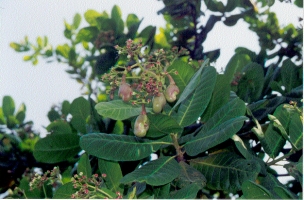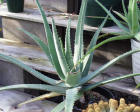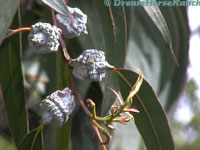

Cashew |
By Lara Pizzorno, M.A.
The miraculous immune system is responsible for the body's basic health, yet few people understand how it works. It should be no surprise that good nutrition and lifestyle play critical roles in maximizing your defense capabilities.
Do you feel zapped of your zest for life? A weakened immune system may be why you're too tired to tango, why that little shaving nick took 10 days to heal, or why every cold and flu in your neighborhood takes up residence in your body.
A poor diet, too much to do and too little time to do it, chemicals in household cleaners, antibiotics in meat and dairy foods, and pesticides in the environment all add up to a significant, continuous challenge to your immune system. Understanding how the immune system protects you and what lifestyle factors compromise its defensive abilities can help you determine the best natural strategies for pumping up your immune muscle.
Like the defensive backs of a football team, your immune system keeps invaders from scoring (infecting you) when they get past the defensive line—the skin and mucous membranes. It also protects you from fumbles (cells that become cancerous). Your immune defense team is composed of white blood cells, proteins in the blood called antibodies, and organs_the thymus, spleen and liver_that supervise, replenish and integrate the immune process. One of your body's most complex systems, the immune system has its own network of vessels, the lymphatic system, which runs parallel to the blood cells.
When a foreign invader enters the body or a cell becomes cancerous, your immune team mobilizes in two ways: cell-mediated immunity and humoral immunity.
Cell-mediated immunity is provided by special white cells that directly attack the invader. These white cells, made in your bone marrow and thymus and distributed throughout your body, help you resist infection from yeast including Candida albicans and from fungi, parasites and viruses such as Herpes simplex and Epstein-Barr. Cell-mediated immunity is also the mechanism through which the body recognizes and destroys the 300 cancer cells the average human being produces each day, thus preventing the development of cancer. Some white blood cells also produce a number of special chemicals that then activate other white blood cells to destroy cancer cells and viruses. Several of these immune system substances including interferon and interleukin are currently being investigated in the treatment of cancer, AIDS and other conditions involving the immune system. The chart below summarizes the main types of white cells and their functions.
Humoral immunity, the immune system's other method of action, involves antibodies— special proteins formed to uniquely match the surface of invaders and either damage them directly or alert white cells to mount an attack.
The thymus gland weighs only an ounce but is the major gland of the immune system. Responsible for producing T-lymphocytes (white blood cells that destroy cancer and virus-infected cells), the thymus also orches trates many immune functions by releasing hormones. Low blood levels of these hormones are associated with depressed immunity and increased susceptibility to infection.
White blood cells (monocyte is shown at center with two lymphocytes adjacent) fight infection by attacking invaders and cleaning up cellular debris. |
Meet Your Defense Team
White Cell
Type
Function and Primary Importance
cytes) cytes)
Neutrophils
Combat and destroy bacterial infection.
Eosinophils
Release an enzyme that breaks down hista- mine, thereby mediating
allergic response.
T-Cells ]
Destroy forect tissue such as cancer cells and (lymphocytes)
virus-infected cells.
B-Cells
Produce antibodies to counter most infections (lymphocytes) and cancer
cells.
Natural killer cells
Destroy abnormal cells including cancer and virus-infected
cells.
Monocytes
Clean up cellular debris after an infection
Macrophages
Engulf foreign particles; aid in general infection resistance.
Mast cells
Release histamine to help battle allergies.
The lymphatic system is an extensive network (four times larger than the venous system that circulates your blood) of vein like tubes, which run parallel to the blood vessels throughout your body. Its functions include draining the fluid from spaces between your cells; draining waste products from tissues; and transporting lymph to lymph nodes where special cells called macrophages filter out debris.
Unlike blood vessels, your lymphatic system moves things without a pumping mechanism like the heart. Instead, it relies on the pushing power of your muscles. Regular exercise, which causes you to contract your muscles, increases circulation of lymph and the system's effectiveness.
The spleen, the largest mass of lymphatic tissue in the body, is approximately the size of a kidney. In addition to engulfing and destroying bacteria and cellular debris, the spleen destroys worn-out red blood cells and platelets and serves as a blood reservoir.
The liver produces most of the body's lymph and contains Kupffer cells. The lymphatic system's stamina depends on Kupffer cells, which filter bacteria, yeast and toxic foreign compounds absorbed by the gastrointestinal tract. Kupffer cells also destroy worn-out white and red blood cells.
Compromising Your System
Mental stress is one of the greatest hazards to the immune system. In Who Gets Sick (Tarcher), Blair Justice, Ph.D., discusses many research studies that demonstrate stress-induced illness is real and that stress contributes to many diseases. However, Justice makes clear it's not stress per se that causes the problem but rather how each person reacts to stress. Negative reactions increase the adrenal gland's secretion of hormones, especially the corticosteroids and catecholamines, which inhibit white blood cells and accelerate thymus shrinkage. The result? A reduction in immune function and an individual who becomes increasingly susceptible to infections, cancer and other illnesses.
Nonstop stress overstimulates the sympathetic nervous system (responsible for the fight-or-flight response during which immune-suppressing hormones are secreted) and suppresses the parasympathetic nervous system (which controls body functions active during sleep, relaxation, visualization or meditation, associated with recovery and healing). Normally, these two systems balance each other, but under persistent stress, the sympathetic nervous system gains the upper hand.
Sugar consumption also inhibits immune function, with suppressive effects starting 30 minutes after consumption and lasting more than five hours. Just 100 grams in any form_glucose, fructose, sucrose (table sugar) or honey_reduces the ability of neutrophils to engulf and destroy bacteria. Since neutrophils constitute approximately two-thirds of your total circulating white blood cells, depressing their activity lowers your resistance. In contrast, eating 110 grams of complex carbohydrates such as whole-grain bread, rice or potatoes doesn't dampen the immune system. How much sugar does the average American consume? A surprising 150 grams of sucrose every day, not counting simple sugars such as those in fruit juice and honey.
Obesity has been linked to decreased immune function. The neutrophils of obese people have a decreased ability to kill bacteria, according to studies cited in A Textbook of Natural Medicine (Bastyr) by Joseph Pizzorno, N.D., and Michael Murray, N.D. Blood cholesterol and lipid levels are also usually higher in obese people. Increased levels of cholesterol and certain lipids such as free fatty acids, triglycerides and bile acids inhibit various immune functions including the ability of lymphocytes to proliferate and produce antibodies and the ability of neutrophils to migrate to areas of infection and destroy infectious organisms.
Alcohol has been shown to increase susceptibility to infections in animals, and alcoholics are known to be more susceptible to pneumonia and other infections. A study of human neutrophils showed a profound drop in their activity after alcohol ingestion, even in nutritionally normal people (New England Journal of Medicine, 1970, vol. 282).
Insufficient rest can diminish the number of disease-fighting natural killer (NK) cells in the blood (Psychosomatic Medicine, April 1995). When a group of volunteers were denied half their usual slumber time for a single night, levels of NK cells, which help fight off viral infections such as the flu, dropped by 30 percent and remained low until patients got a normal night's sleep.
Undernourishment from inadequate consumption of fresh fruits and vegetables, whole grains and legumes, coupled with the excessive intake of fat, sugar and protein, which makes up the typical American diet, is cited as a frequent cause of impaired immune function. In population studies conducted by the U.S. Department of Agriculture, randomly selected samples of the population have been analyzed for vitamin levels. Surveys consistently demonstrate that almost 90 percent of those tested have at least one deficiency, and almost 60 percent have two or more deficiencies.
Three Steps to Achieving a Healthier Immune System
To build your immunity, first correct factors in your life that compromise your immune system, whether it's lightening your stress; reducing your consumption of simple sugar, alcohol and fats; eating more whole grains, legumes, fresh fruits and vegetables; and/or getting sufficient rest and exercise.
Next, supply your immune system with adequate amounts of the vitamins and minerals needed for optimal immune function. Murray and Pizzorno recommend supplementation with immune-supportive nutrients such as vitamins A and C, beta-carotene and zinc. Vitamin A helps maintain the integrity of the body's first line of defense— the skin and mucosal surfaces—and has been shown to stimulate and enhance numerous immune processes including induction of cell-mediated immunity against tumors, natural killer cell activity, monocyte phagocytosis and antibody production.
Antiviral and antibacterial, vitamin C enhances white cell function and activity. It also increases interferon levels, antibody levels and secretion of immune-supportive thymic hormones. Vitamin C is concentrated in white blood cells, particularly lymphocytes, but is rapidly used during infection, indicating a need for regular replenishment.
Epidemiological studies have found that the higher the intake of beta-carotene, the lower the incidence of cancer. Carotenes are a group of plant pigments that provide the plant cell with potent antioxidants. In humans, their protective effect is most obvious in epithelial cell (cells lining the surfaces of organs or the body) cancers, for example, cancer of the lungs, gastrointestinal tract, genito-urinary tract and skin. In addition, carotenes may have other immune-enhancing effects. A 1994 study reported in the American Journal of Clinical Nutrition found that beta-carotene stimulated lymphocytes in both HIV-infected patients and healthy controls.
Zinc is essential for cell-mediated immunity, humoral immunity and thymus function. When zinc levels are low, the number of T-cells drops, thymic hormone levels are lower and white blood cell functions are impaired. All these effects are reversed by adequate zinc. Severely malnourished and immuno-suppressed children in Bolivia who received a daily zinc supplement returned to normal immune competence within one month (Lancet, 1995, vol. 345). One caveat: Excessive consumption of zinc (over 75 mg./day on a regular basis) can impair immune function.
Finally, use herbal immune-boosters to help knock out a cold or flu or recharge a flagging immune system. Four plants widely used by naturopathic doctors are echinacea, goldenseal, licorice and shiitake mushroom.
Echinacea. In addition to containing a polysaccharide, or complex carbohydrate, component called inulin that activates the body's resistance to infection, echinacea has other polysaccharides that bind to T-lymphocytes and other white blood cells. This binding activates T-cells and increases production of interferon (a natural antiviral substance). The result is enhanced T-cell production, macrophage phagocytosis (the engulfing and destruction of bacteria or viruses by white cells), natural killer cell activity and increased levels of circulating neutrophils. Echinacea prevents the spread of viruses such as influenza and herpes via its ability to inhibit a bacterial enzyme called hyaluronidase, which organisms use to break through skin and mucous membranes to enter the body.
Goldenseal. This herb increases the blood supply to the spleen and promotes the spleen's release of immune-enhancing compounds. Berberine, a component of goldenseal, has also been shown to jump-start macrophages, the cells responsible for engulfing and destroying bacteria, viruses, fungi and tumor cells.
Licorice. Licorice is helpful in respiratory tract infections such as bronchitis and pneumonia. Scientific evidence suggests licorice's efficacy is due to its content of glycyrrhizic acid, which enhances interferon production.
The interferon then binds to cell surfaces and stimulates synthesis of proteins that prevent viral infection. Extracts of licorice have also been shown to inhibit growth of human viruses in cell cultures including Herpes simplex type 1 and bacteria such as Staphylococcus sp., Streptococcus sp. and Candida albicans. Licorice also protects the thymus from the stress-related hormone cortisone.
Shiitake mushroom. Shiitake has been used for centuries in traditional Chinese medicine to increase resistance to infection. Research suggests much of its activity is due to a compound called lentinan, which has demonstrated significant immune-stimulating and antitumor activity. It increases interferon and T-cell production, enhances helper T-cell activity and increases macrophage activity.
Lara Pizzorrno, M.A., is a health and nutrition writer living in Seattle, Wash. Visit New Hope Groups' World Wide Web site at http://www. newhope.com for more Delicious! Magazine stories on immunity.
 |
Aloe Vera |
Reprinted with permission from the October 1995 issue of Delicious! Magazine, a publication of New Hope Communications, Boulder, CO.
 |
Eucalyptus |